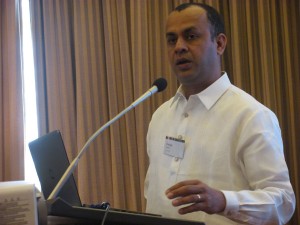MANILA, Philippines – Senator Ralph Recto said on Tuesday that the move of the Banko Sentral ng Pilipinas (BSP) to commit $1 billion from the country’s dollar reserves for the International Monetary Fund’s bailout package for European economies must be further explained.
In a statement, Recto said he is not opposing the government’s decision but said that the BSP has no sole proprietary rights over the Philippines’ dollar reserves. He added that the BSP should first request for a consensus or secure appropriation cover from Congress.
“I’m not totally opposing it but how can the government, through the BSP, lend money to IMF without authority from Congress?” Recto asked.
He added that he was willing to listen to the BSP’s explanation and why it would deny Filipinos of its claim to $1 billion worth of projects and programs that could better improve their lives.
The statement came after the BSP last week announced its plan to loan $1 billion to the IMF to be used for the stabilization of the global economy. The BSP said that the Philippines, as a member of the global community, has the obligation of ensuring global economic and financial stability.
However, Recto said that it must be made understandable by the people why such amount is being lent to the IMF while the country continues to borrow from other international lending and multilateral institutions to augment the national budget and deficit spending.
Recto added the $1-billion loan could instead be used to bankroll local projects like construction of schools, hospitals and other important infrastructure that will have more impact to the country.
“The BSP could remit the amount as dividend to the national government and use it for the country’s so many needs,” Recto said.
“Or the BSP, like a regular bank taking care of business, could loan the amount directly to the national government under the same interest rate that it would get from the IMF,” he added.
Recto also stressed that if the loan is being promised to attempt to stabilize the peso which has been lately appreciating, there could be other ways like boosting the export sector, protect the Philippine economy from the contagion of the European economic crisis, and use the $1-billion to boost local economy and trigger consumption and growth.
“Spending it to boost consumption is the better way to protect us from contagion,” he said.
Recto added that once the country’s economic growth attains a good foothold, global credit agencies will likely give the country a credit upgrade which will help attract more investors.
“At the end of the day, the country would not be judged on how it helped a troubled First World economic bloc, but on how it exercised fiscal maturity to achieve long-term growths and spared itself from befalling the same fate of the European economies,” Recto said.



